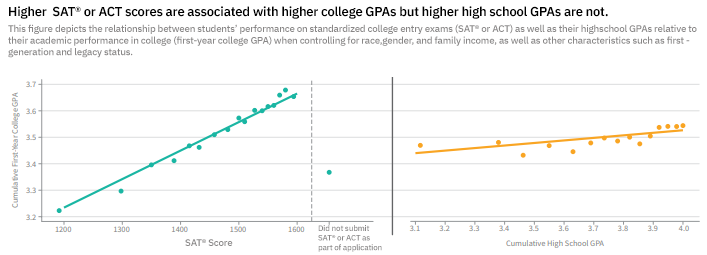
How to think About College Applications
If you are like most people, the prospect of making a choice about where to spend the next four..

During the COVID-19 pandemic, hundreds of colleges relaxed their standardized testing policies, making the ACT and SAT® optional for all applicants.
During the COVID-19 pandemic, hundreds of colleges relaxed their standardized testing policies, making the ACT and SAT® optional for all applicants. Now, in 2024, the pendulum has swung the other direction. Just in the class two months, three Ivy League universities–Yale, Dartmouth, and Brown–have reinstated standardized test requirements, and many more colleges are making similar shifts.
Even among test-optional universities, the ACT and SAT® will play an increasingly important role in admissions. According to a recent survey of top colleges, 84% will use ACT and SAT® scores as a criterion for admission, 53% will consider ACT and SAT® scores either “important” or “very important,” and only 4% will not look at scores at all. These findings reinforce existing evidence that submitting your test scores almost doubles your odds of being accepted at an elite university.
The shift back to the ACT and SAT® is based on mounting evidence that, despite once-popular perceptions, a) tests are strongly predictive of academic performance in college and b) test optional policies may actually undermine cultural and socioeconomic diversity.
“Standardized test scores are a much better predictor of academic success than high school grades,” Christina Paxson, the president of Brown University, recently wrote.
“Just getting straight A’s is not enough information for us to know whether the students are going to succeed or not,” according to Stuart Schmill, the dean of admissions at M.I.T.
“SAT® by itself explains about 22% of the variation in first-year GPA. High school GPA by itself explains 9% of the variation,” reads a recent working group paper from Dartmouth College.

Even if you think you are applying to test optional schools, taking the ACT and SAT® seriously is essential:
At the Krupnick Approach, we have analyzed 26,000 official questions, conducted probability analysis, and navigated through every possible category framing and answer pattern in existence. In building a software platform and backtesting every ACT since 1996 and SAT® official exam question since inception, we’ve arrived at algorithms, formulas, and rules that have eluded other test prep services because they (i.e. the rules) are buried deeply in the test. Our test-specific rules and content-related rules do not exist anywhere else in the world. Many of them, we are convinced, the test makers themselves may not be fully aware of. Coupled with the customized approach that we formulate with students in intensive one-on-one sessions, these rules create opportunities for average improvements of 7 points on the ACT and 250 points on the SAT®–the best track record anywhere in the area.

If you are like most people, the prospect of making a choice about where to spend the next four..

Whether you’re preparing for the ACT and SAT®, graduate-level exams, or just looking to improve your academic performance..

Colleges and universities that “superscore” the ACT or SAT® will consider each applicant’s highest individual subject score from..
SAT® is a trademark registered by College Board® which is not affiliated with and does not endorse this site